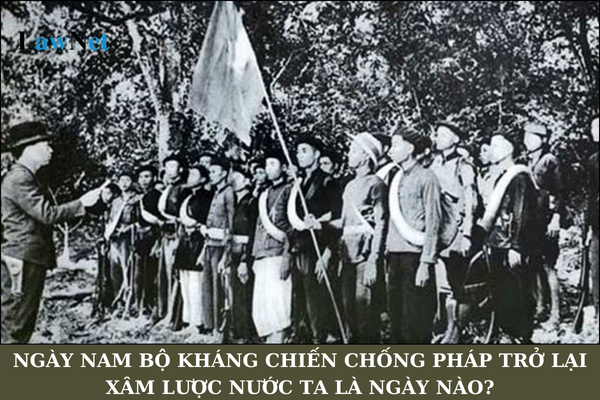Which date commemorates the Southern Region's resistance against the return of French invasion in Vietnam?
Which date commemorates the Southern Region's resistance against the return of French invasion in Vietnam?
In the scheme issued with Decision 665/QD-TTg in 2008:
To implement this directive, on the occasion of the nationwide commemoration of 1,000 days of the Southern resistance against the French colonial invasion (September 23, 1945), on June 11, 1948, President Ho Chi Minh issued a Call for Patriotic Emulation.
The date of the Southern Region's resistance against the return of French invasion in Vietnam is September 23, 1945.
Just 21 days after our country gained independence, the French colonialists revealed their ambition to re-invade our country once again. On September 23, 1945, they unexpectedly opened fire and attacked Saigon, officially igniting the second invasion war against Vietnam. This action not only shattered the newly established peace but also pushed our people into a life-and-death challenge in the struggle to defend national independence.
Amidst that urgent situation, on September 23, 1945, the Central Communist Party, led by President Ho Chi Minh, along with the Southern Regional Party Committee, the People's Committee, and the Southern Resistance Committee promptly launched a resistance movement. This call awakened the fierce patriotism throughout the army and people of the Southern Region, transforming this area into the first frontline against the French colonial invasion.
Therefore, September 23, 1945, is recorded as the date of the Southern Region's resistance against the return of French invasion in Vietnam, symbolizing the indomitable spirit and deep patriotism of our people during the early period of resisting the French re-invasion.

Which date commemorates the Southern Region's resistance against the return of French invasion in Vietnam? (Image from the Internet)
What is the objective of the upper secondary school education program for the subject of History in Vietnam?
Based on Section III of the General Education Program for the History Subject issued with Circular 32/2018/TT-BGDDT, the objectives of the upper secondary school history education program are specified as follows:
- The History curriculum helps students develop historical competence, which is a manifestation of scientific competence formed at the middle school level; it contributes to educating national spirit, patriotism, the fine traditional values of the nation, and the quintessence of human culture, as well as the qualities and capacities of Vietnamese citizens, global citizens in line with the developmental trends of the era;
- It helps students access and clearly understand the roles and characteristics of historical science as well as the connection between history and other scientific fields and professions, creating a foundation for students to orient their future careers.
What are requirements for upper secondary school students in Vietnam when studying history?
Based on Section IV of the General Education Program for the History Subject issued with Circular 32/2018/TT-BGDDT, the requirements for upper secondary school students studying history are as follows:
(1) Key qualities and general competence requirements
The History subject contributes to forming and developing key qualities and general competence at levels suitable for the subject and grade as regulated in the overall curriculum.
(2) Specific competence requirements
The History curriculum helps students develop historical competence based on basic and advanced knowledge of world, regional, and Vietnamese history through a system of themes and topics on political, economic, social, cultural, and civilization history. Historical competence comprises elements such as researching history; historical cognition and thinking; application of learned knowledge and skills.
Specific manifestations of historical competence include:
- Researching history includes:
+ Identifying types of historical documents; understanding the content, exploiting, and utilizing historical documents in the learning process.
+ Reconstructing and presenting through speaking or writing the progression of historical events, figures, processes from simple to complex; identifying historical events in specific space and time.
- Historical cognition and thinking:
+ Explaining the origins and development of historical events from simple to complex; identifying the process of historical development in chronological and synchronic context; comparing similarities and differences between historical events, and reasoning causal relationships in historical progression.
+ Providing personal opinions and assessments of historical events, figures, and processes based on historical cognition and thinking; understanding the continuity and changes in history; thinking in different ways when considering, evaluating, or seeking answers about an event, figure, or historical process.
- Applying learned knowledge and skills:
Drawing historical lessons and applying historical knowledge to explain contemporary life issues; based on this foundation, having the ability to independently explore historical issues, develop creative capabilities, having the capacity to access and process information from various sources, with a conscious and competence to self-learn history for life.

